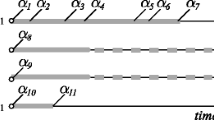Abstract
Due to the rapid growth of the Web, there is an increasing need for methodologies that support the design of Web-based Information Systems (WIS). After investigating the application of existing hypermedia design methodologies in the context of automated hypermedia presentation design we propose a specification framework for this context.
The framework considers the possibility of dynamically gathering information from a collection of structured, but also possibly heterogeneous sources (relational or object-oriented databases, XML repositories etc.). The methodology associated with the framework shows two levels of abstraction: the logical level, and the presentation level. At the logical level the application diagram captures the design of slices, thus specifying the content related grouping of data elements and their relationships. At the presentation level, the presentation diagram bridges the logical level and the actual implementation by specifying how the design of slices is translated into hypermedia mechanisms, e.g. hyperlinks.
Access this chapter
Tax calculation will be finalised at checkout
Purchases are for personal use only
Preview
Unable to display preview. Download preview PDF.
Similar content being viewed by others
References
Balasubramanian, P., Isakowitz, T., Stohr, E.A.: RMM: A Methodology for Structured Hypermedia Design. Communications of the ACM, 38(8):33–44, August 1995.
Barbosa, S.D.J., Rossi, G., Schwabe, D.: Systematic Hypermedia Application Design with OOHDM. Hypertext, 1996.
Bieber, M., Isakowitz, T., Vitali, F.: Web Information Systems. Communications of the ACM, 41(7):78–80, July 1998.
Brusilovsky, P., DeBra, P., Houben, G.J.: Adaptive Hypermedia: From Systems to Frameworks. ACM Computing Surveys, 31(4es), Article No. 12, December 1999.
Ceri, S., Fraternali, P., Bongio, A.: Web Modeling Language (WebML): a modeling language for designing Web sites. WWW9, 2000.
Fraternali, P., Paolini, P.: Model-Driven Development of Web applications: the Auto Web system. ACM Transactions on Information Systems, 18(4):323–382, October 2000.
Garzotto, F., Paolini, P., Schwabe, D.: HDM-A Model-Based Approach to Hypertext Application Design. ACM Transactions on Information Systems, 11(1):1–26, January 1993.
Bulterman, D.C.A., Hardman, Mullender, K.S.L., Rutledge, L., van Ossenbruggen, J.: Do You Have the Time? Composition and Linking in Time-based Hypermedia. Hypertext and Hypermedia, 1999.
DeBra, P., Houben, G.J.: Automatic Hypermedia Generation for ad hoc Queries on Semi-Structured Data. Digital Libraries, 2000.
De Bra, P., Houben, G.J., Wu, H.: AHAM: A Dexter-based Reference Model for Adaptive Hypermedia. Hypertext and Hypermedia, 1999.
Diaz, A., Isakowitz, T.: RMCase: A Tool To Design WWW Applications. Fourth International World Wide Web Conference, 1995.
Houben, G.J.: HERA: Automatically Generating Hypermedia Front-Ends for Ad Hoc Data from Heterogeneous and Legacy Information Systems. Engineering Federated Information Systems, 2000.
Isakowitz, T., Kamis, A., Koufaris, M.: Extending RMM: Russian Dolls and Hy-pertext. HICSS, 1997.
Isakowitz, T., Kamis, A., Koufaris, M.: Reconciling Top-Down and Bottom-Up Design Approaches in RMM. Workshop on Information Technologies and Systems, 1997.
Isakowitz, T., Kamis, A., Koufaris, M.: The Extended RMM Methodology for Web Publishing. New York University, 1998. Available online at http://rmm-j ava.stern.nyu.edu/rmm/.
Author information
Authors and Affiliations
Editor information
Editors and Affiliations
Rights and permissions
Copyright information
© 2001 Springer-Verlag Berlin Heidelberg
About this paper
Cite this paper
Frasincar, F., Houben, G.J., Vdovjak, R. (2001). An RMM-Based Methodology for Hypermedia Presentation Design. In: Caplinskas, A., Eder, J. (eds) Advances in Databases and Information Systems. ADBIS 2001. Lecture Notes in Computer Science, vol 2151. Springer, Berlin, Heidelberg. https://doi.org/10.1007/3-540-44803-9_25
Download citation
DOI: https://doi.org/10.1007/3-540-44803-9_25
Published:
Publisher Name: Springer, Berlin, Heidelberg
Print ISBN: 978-3-540-42555-7
Online ISBN: 978-3-540-44803-7
eBook Packages: Springer Book Archive




